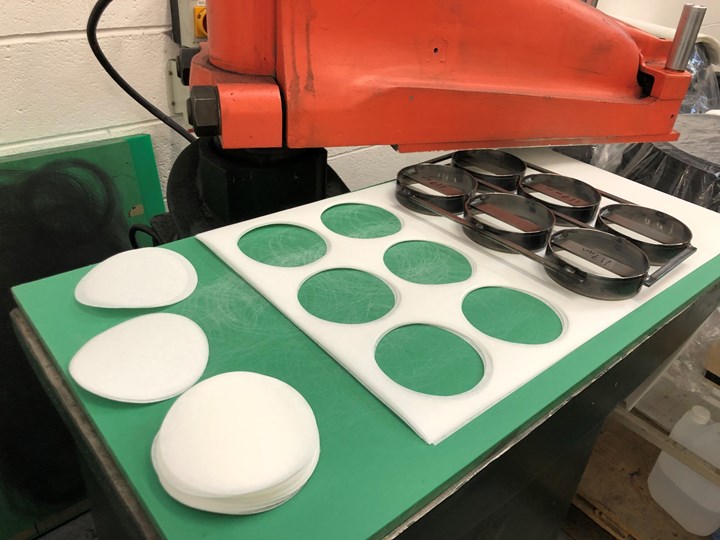Leaders in the composites industry work together to develop ventilators for COVID-19 patients
A U.K.-government funded project collects Meggitt, GKN, Rolls-Royce, Airbus and others to quickly help meet demand.

A team led by Meggitt (Christchurch, U.K.), also comprising GKN (Redditch, U.K.), Thales and precision engineering firm Renishaw (Wotton-Under-Edge, U.K.), is one of three consortia tasked by the U.K. government to meet an urgent demand for hospital ventilators due to the coronavirus pandemic.
The aerospace and defense group, plus two from the automotive industry headed by McLaren (Woking, U.K.) and Nissan (Sunderland, U.K.), are aiming to design prototypes by the end of next week as demand grows for the life-saving kit to deal with severe cases of respiratory illness caused by the COVID-19 outbreak.
This effort follows an appeal by Prime Minister Boris Johnson on March 16 for the country’s industry to deal with a shortfall in the breathing aids by creating a U.K. supply chain, with the project managed by the Solihull-based research organization. According to project partners, it is understood that one or more of the consortia will be asked to mass-produce their design once the prototypes are complete.
The target is to produce 5,000 units “as soon as possible,” with an ultimate target of 30,000 machines. The U.K. is thought to only have 5,000 ventilators in its National Health Service (NHS), with availability from a small number of overseas specialist manufacturers having dried up as other countries focus on their own needs.
Meggitt’s experience in manufacturing oxygen systems for aircrew was the reason it was selected to head the aerospace consortium. However, a company source admits that it will have to bring in external experts to manage the medical certification process.
Other U.K.-based companies have expressed their willingness to contribute, including Rolls-Royce (London, U.K.) and Airbus.

Source | Bindatex
On March 23, Bindatex (Bolton, U.K.) reported that it is supporting the U.K. government’s call to produce more ventilators. Bindatex has reconfigured its production to begin die cutting discs for filters to assist with the urgent production of ventilators for the NHS. At present, Bindatex is working with its customers and is manufacturing the parts, but says it is also able to support other manufacturers by providing the filters.
“As production ramps up for the essential parts for these ventilators, we have added extra capacity to fulfill current orders while this emergency work continues. We will continue to support manufacturing of ventilators during these unprecedented times,” says Chris Lever, managing director of Bindatex.
Related Content
Low-cost, efficient CFRP anisogrid lattice structures
CIRA uses patented parallel winding, dry fiber, silicone tooling and resin infusion to cut labor for lightweight, heavily loaded space applications.
Read More“Structured air” TPS safeguards composite structures
Powered by an 85% air/15% pure polyimide aerogel, Blueshift’s novel material system protects structures during transient thermal events from -200°C to beyond 2400°C for rockets, battery boxes and more.
Read MoreIndustrializing additive manufacturing in the defense/aerospace sector
GA-ASI demonstrates a path forward for the use of additive technologies for composite tooling, flight-qualified parts.
Read MoreDevelopment of a composite liquid hydrogen tank for commercial aircraft
Netherlands consortium advances cryogenic composites testing, tank designs and manufacturing including AFP, hybrid winding, welding of tank components and integrated SHM and H2 sensors for demonstrators in 2025.
Read MoreRead Next
Ultrasonic welding for in-space manufacturing of CFRTP
Agile Ultrasonics and NASA trial robotic-compatible carbon fiber-reinforced thermoplastic ultrasonic welding technology for space structures.
Read MoreCutting 100 pounds, certification time for the X-59 nose cone
Swift Engineering used HyperX software to remove 100 pounds from 38-foot graphite/epoxy cored nose cone for X-59 supersonic aircraft.
Read MoreNext-gen fan blades: Hybrid twin RTM, printed sensors, laser shock disassembly
MORPHO project demonstrates blade with 20% faster RTM cure cycle, uses AI-based monitoring for improved maintenance/life cycle management and proves laser shock disassembly for recycling.
Read More.jpg;width=70;height=70;mode=crop)












